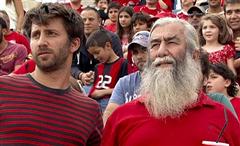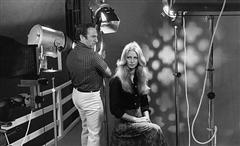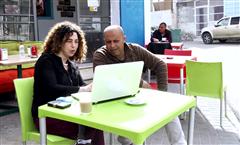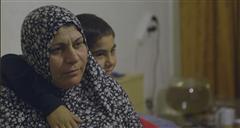Pepe Alalu, age 69, one of the left-secular leaders in Jerusalem, is running for mayor. In a divided city that is becoming more religious and right wing, he knows his chances are low. Still, he believes that his run is important as an idealistic alternative and a ray of hope for the insecure future of the Israeli left-wing. His son, Michael, age32, the director of the film, decides to help Pepe in his fight against windmills. Though there is a huge gap between father and son, the two will begin to bridge their differences in the course of the election campaign and finally reach an understanding.
Tel Aviv, on the corner of Dizengoff and Arlozorov. Every day many Israelis walk by the photo shop that was once glorious and remains engraved in the collective memory as the epitome of family and wedding photos, but few know the story behind it.
Member of the youngest generation of the Farag family, director Kobi Farag went on a journey to discover the family history. By digging in the private archives, he peeled layer by layer to reveal the story of ten brothers and sisters who immigrated from Bagdad in the fifthties and climbed the ladder of success from their lives in the transition camp to a luxurious home.
In his own way, he tries to solve the riddle of the painful disintegration of the family that drifted apart.
Dana and Amit met when they were 25, they married and had 2 children. Soon after their second child, Amit turned ultra-orthodox. Dana stayed secular. They are still very much in love. Will their love be able to overcome the growing gaps between them?
Former enemy combatants on both sides of the Israeli-Palestinian conflict set out on a joint journey for peace. This movie documents the transformation of its protagonists from soldiers on the battlefield to peace activists. While they are facing opposition from their societies, which consider them traitors, another war looms in Gaza.
In Jerusalem’s Biblical Zoo, Israelis and Palestinians work alongside one another to tend to the elephants, crocodiles and rhinos. Inevitably, tensions within and across animal species reflect themselves in the mostly good-natured, always edgy interactions between employees, who lead regular tours of schoolchildren through the zoo’s grounds. Comprised of Jewish and Muslim students, these tours are always led separately, and each group learns different details about the same animals, stories which are constructed to reflect the glories and struggles of the children’s distinct yet neighboring cultures. Katharina Waisburd’s keen eye results in a sensitively shot film, offering an unforgettable and innovative glimpse into the current conflict in the Holy Land.
Terminally ill patients in Israel are given the option to die in their own homes rather than in a hospital. Those who choose this are eligible for a state-funded home hospice team- doctor, nurse and social worker. Providing physical and mental support, the team assists the patients in parting from what is here and arriving there. Home hospice staff members are experienced with death, having witnessed it dozens of times. They choose confronting death as a way of life, and they have an established protocol for how one should die. Still, every home they enter is a new story and a new challenge.
Yaniv,28, lives with his parents in Kiryat Ata-a suburban city in northern Israel. Over the years, Yaniv witnesses best friends leave home, his little sister get married and leave home and his copywriting colleagues work and succeed in Tel Aviv, while he remains in the same place. Maayan (the filmmaker) and Yaniv have been friends for over 10 years. The film provides a glimpse into their honest companionship. Recently, Yaniv shares with Maayan his desire to leave home in order to become truly independent for the first time, even at the cost of risking his own life. Yaniv takes us on a journey full of humor, which challenges conventional thinking about what it means to be alive. The film displays life as a constant struggle between desire and determination, between body and spirit and between helplessness and optimism.
Arab and Jewish business partners transcend their cultural differences and create a model of co-existence.
There is a building in Hebron abandoned by its Palestinian residents, known as “The Silent House”. Remaining in the building are Saher, a deaf woman, with her only son, 8-year-old Yusuf. The film reveals the extraordinary story of two men in conflict, as it is told from the perspective of Yusuf, a charismatic boy of between two parts of the divided city.




